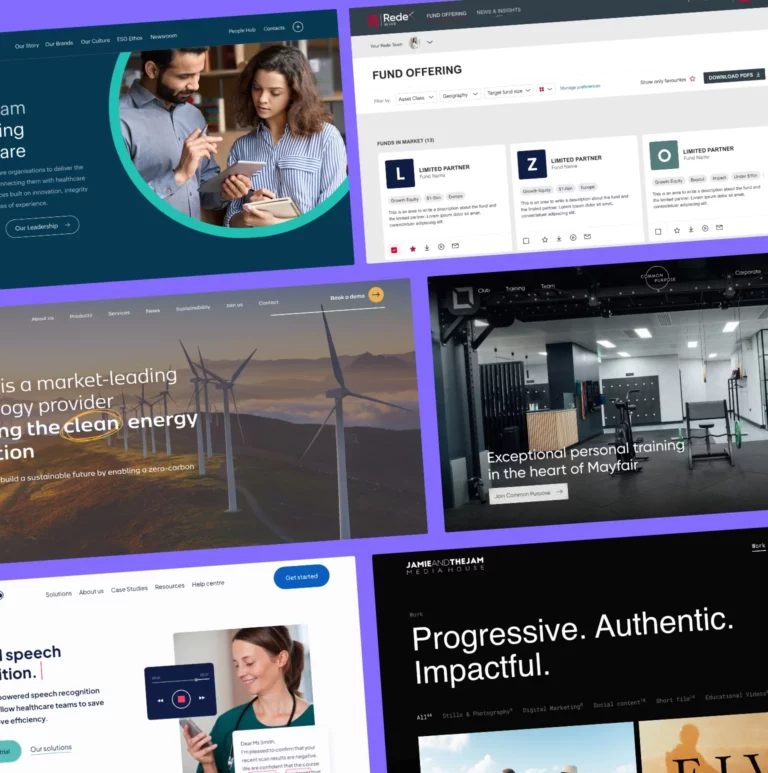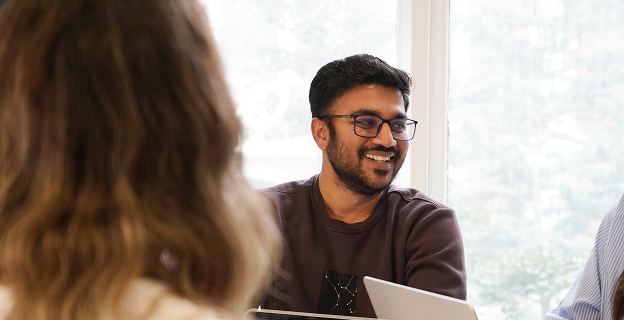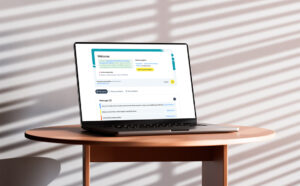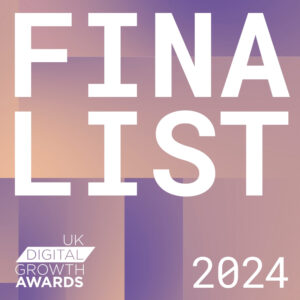As we’re now into the first week of 2023, this feels like an appropriate time to reflect on what was another thoroughly successful year for SoBold in 2022.
We’re now working with enterprise clients and providing them with excellent website design and development services. We’ve also continued to grow our client base and are proud to have consistently produced outstanding work on their behalf throughout the year.
We’re pleased to have strengthened our presence in the healthcare and financial services industries. Now, we’re looking forward to building and managing more scalable products for our clients in the year ahead.
Our High-Performance Team
The definition of “high-performance” will vary from person to person, and you may have your own idea of what it means to you. For us, as an agency, it means every member of our team holds each other accountable to always perform at the highest possible level, so we can achieve a standard of excellence for all our clients.
We’ve used “high-performance” as a core value of our company since day one, and have worked very hard over the years to build a “high-performance” team. In 2022, this continued to develop and has allowed us to push those standards even higher, which is something we take a lot of pride in.
We were excited to see all three of our business teams grow in 2022: design, development, and operations. Over the past year, we also made a conscious effort to ensure the whole agency is working closer together as a more functional unit, for the benefit of our clients.
As the team has grown, we’ve had to implement more processes, which has allowed us to scale, and will enable us to continue to scale, as we move into the next cycle of our business.
Congratulations to Ivo Georgiev, who’s coming to the end of a successful apprenticeship scheme, which he did with us and the help of QA’s Tech, Digital, and IT Apprenticeship.
The SoBold Website!
In 2022 we launched our new SoBold website. Finding time to do this while continuously delivering projects for our ever-growing client base was a challenge, but one I’m really proud of the team for managing so well. We used this as a beta project to roll out a new SoBold workflow, and whilst there’s still some way to go to perfect this, we’re really happy with how it’s looking on the front-end!
Every member of the team worked on this in some way or another, and we’re already getting considerably more inbound leads and exposure from it.
We’ve been working hard on becoming more active in the online community as well, and this is notable particularly over the last quarter where we’ve increased our marketing. We were fortunate to be interviewed by Cloudways, who are a cloud hosting service provider we work closely with, and you can see this interview here.
Clutch has continued to be a new business driver for us and our profile has gained more exposure amongst the country’s best website design and development businesses.
We’ve also begun producing a selection of in-depth guides and blog articles to help our community more easily navigate the current technology landscape. You can find all that useful content on our blog.
Our Clients
We’re grateful to have worked with so many wonderful people from some brilliant clients over the past 12 months, and have built an array of different sites each with their own unique brief and challenge.
If you’d like to gain insight into the process we follow with our clients for project briefings, check out this recent article, which also includes a helpful brief template.
This is a great chance to showcase below some of the work we’re most proud of in 2022, for a selection of companies who are doing some very interesting things to make positive change in their respective industries:
Built and Live
Jamie and the Jam – Jamie and the Jam conceptualise, create, deliver, and manage beautifully bespoke content for their clients and their audiences.
Amplitude Clinical – Amplitude is a leading UK Patient-Reported Outcome Measures (PROMs) and clinical outcomes platform.
Arenko – Arenko is a market-leading technology provider enabling the clean energy transition.
Dictate.IT – Dictate.IT helps healthcare organisations across the UK and Ireland harness the power of speech to deliver seamless, efficient, and effective document management.
Edgerley Simpson Howe – Edgerley Simpson Howe are specialist out-of-town retail, leisure, and commercial roadside property consultants.
Pippo – Pippo lets you book your GP appointments whenever and wherever suits you.
Common Purpose – Common Purpose offers exceptional personal training in the heart of Mayfair. If you’re looking to start with a new gym or PT in the new year, Common Purpose are your guys to speak to!
Still Waiting to go Live!
Coller Capital – Coller Capital is one of the largest global investors in the private equity secondary market.
Healthlink – Healthlink connects more than 15,000 medical organisations across Australia and New Zealand.
Konnect Net – Konnect Net helps businesses in the insurance and health sectors exchange data in a quick and secure way.
Turvec – Turvec is a bike parking company specialising in designing, installing, and maintaining secure and user-friendly bicycle storage solutions and two-tier bike racks.
There’s also a handful of special clients listed below that want to highlight, either because of the longevity of the relationships or the positive impact our work has made on their businesses:
Kapow Primary
Kapow Primary, whom we’ve been working with since 2018, is now used in almost one third of all UK primary schools, with over 30,000 primary school teachers using the Kapow Primary platform each week.
Our amazing Kapow team has been working on some really inspiring projects over the past few months particularly, and we cannot wait to share more when we publish these live.
You can learn more about our work with Kapow, and how we first started, in our case study here.
Rede Partners
We started working with Rede Partners in late 2019 to help bring their vision ‘RedeWire’ to life. RedeWire is a new interactive online limited partner (LP) portal, providing instant access to Rede’s current fundraising offering.
RedeWire has had a closed launch, so we’re really excited for it to launch to their wider audiences in Q1 of this year.
Transport for London
Transport for London has renewed its cookie management contract with us for a fifth successive year. This highlights not only the great work we’re doing with them, but the importance of the relationship we’ve built with them.
We recently became only the third Platinum Certified Partner with Cookie Bot in the UK and this is a service we believe will continue to grow into 2023 and beyond.
You can learn more about our work with Transport for London here, and you can also read about our contract renewal in our press release here.
Clanwilliam
We’re proud to have been working with Clanwilliam since 2017, and our relationship has flourished each year since then. We initially started working with their Global HQ, before being rolled out across their three divisions Clanwilliam Ireland (site being redesigned in Q1 2023!), Clanwilliam UK, and Clanwilliam ANZ.
We work with over 15 of their brands designing, developing, managing, and hosting their websites. We also work closely with these brands to help them with their branding and print design activations.
2022 saw Clanwilliam take a major shift in their global brand, choosing us to help them rebrand from Clanwilliam Group, dropping the ‘Group’. We worked closely with their Global Brand and Communications Director, Lauren Turner, to help bring this to life.
We all went into the process looking to rebrand Clanwilliam in its entirety, changing the logo and creating a completely new brand. However, we quickly realised the logo was going to stay and the brand needed to change around this.
We uplifted Clanwilliam’s colour pallet and fonts, creating a new brand that much better reflects their company’s values and ambitions.
You can see a more detailed case study about what we did here.
It’s Not All Websites Though!
Our talented Graphic Design Team was busy in 2022 too, across multiple rebrands and supporting various Knight Frank divisions. Some of our Knight Frank work is highlighted here.
We’ve also successfully managed to move all our clients into our Positive Park Hosting environment, which is based in Cambridgeshire. This has meant all our sites are running on a more optimised and bespoke server, tailored to their needs. Our VIP enterprise-grade support at the hosting park has made a positive impact, ensuring all our clients have peace of mind that their sites are secure and stable.
The hosting environment is an eco-friendly data centre that uses 100% renewable energy and is certified by the Green Web Foundation.
You can learn more about our hosting solution on our WordPress Website Hosting service page.
In addition to working with our clients, we’ve also been working hard on improving our processes, becoming more compliant and becoming a more reputable company across the board.
We became ISO 90001-compliant in 2022 and have successfully put our project management systems in place. Our Project Manager, Anna de Moraes, has been instrumental in implementing processes to optimise our workflow, and she’ll continue to drive the business forward into 2023.
We were absolutely delighted to work with Nation.Better to get a Skilled Licence VISA sponsorship as well, which opens up opportunities for us to hire more global talent. This is something as a business we’ve been looking forward to for a while now. Getting this licence and already hiring two people, and giving them the opportunity to work in London, is something we’re really proud of.
We also renewed both our Living Wage Accreditation and Cyber Essentials certification.
2023 and Beyond!
2023 is only going to be bigger and better for us here at SoBold. We have big plans to execute on our hiring strategy and intend to grow the team across all areas of the business. Doing so will help us continue to improve the service we provide to our clients.
We’ll continue to work with key clients in our industry focuses: healthcare, finance, real estate, and SaaS. As we work with more medium to enterprise-sized clients, we’re confident we’ll become more recognised as the High-Performance WordPress agency.
Thanks for reading. We hope you have a great year in 2023!
To keep up with all the latest news and updates from our agency, and gain priority access to our weekly learning resources, please do join our community by subscribing to our newsletter below.






